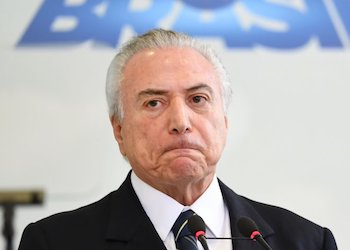Brazil’s President Michel Temer allegedly encouraged a businessman to pay hush money to a jailed associate, a remarkable illustration of how deeply-ingrained corruption is in Brazil’s political system.
A surruptitously recorded conversation from March of this year between Temer and Joesley Batista, the chairman of Brazilian meat-packing giant JBS, shows Temer appearing to give his approval to Batista as the businessman discusses plans to make payoffs to ensure that an investigation of his company turns out favorably.
Joesley Batista, together with his brother Wesley, entered a plea bargain with Brazilian authorities after JBS was implicated in illicit transactions with state-owned banks and pension funds, reported Bloomberg. As part of a deal, the Batistas handed over to the authorities the recording of a conversation between Joesley and Temer. In return, the brothers will not face trial, and have committed to a fine of $67 million.
During the conversation, Joesley Batista tells Temer that the businessman is trying to interfere in the investigations against him, and the president seems to approve of his strategy.
“I already made sure both judges [who will be looking into the case] are on my side,” Batista is heard saying in the recording.
“Great, great,” the president replies.
Batista then adds that he has been seeking the support of other potential allies, and claims he has been paying hush money to former lower house speaker Eduardo Cunha and lobbyist Lucio Funaro, both of whom have been jailed on charges relating to a massive and ongoing graft scandal involving state oil company Petrobras.
Upon hearing about the bribe scheme, Temer says, “You need to keep it going, OK?”
A member of the president’s Brazilian Democratic Movement party (Partido do Movimento Democrático Brasileiro – PMDB), Cunha initiated the impeachment proceedings that led to the ouster of former President Dilma Rouseff, which allowed Temer to assume power in August 2016.
Cunha has made claims alluding to the many secrets he knows that could help incriminate prominent politicians and businessmen, which seems to explain why Batista might have had an interest in buying his silence.
SEE ALSO: InDepth Coverage of Elites and Organized Crime
In addition to the purported payoffs to Cunha, President Temer and Batista have also been linked to the Petrobras scandal.
On March 13, Batista met with Rodrigo Rocha Loures, a PMDB congressman and Temer’s aide. The JBS chairman allegedly set up a corruption scheme with Rocha Loures whereby government officials would receive bribes in return for ensuring Petrobras would supply cheap gas to a firm that belongs to J&F, the holding company that controls JBS.
As footage recorded by authorities and obtained by O Globo shows, Rocha Loures met on April 28 with a JBS executive, Ricardo Saud, who handed him $160,000. The money was allegedly part of a total of $142 million in bribes that JBS had negotiated with Rocha Loures.
Petrobras has been at the centre of a massive corruption scandal that involves executives of the state-owned company issuing inflated public work contracts to private companies in exchange for bribes. A historic anti-corruption operation, dubbed “Operation Car Wash” (“Operação Lava Jato”), has revealed that some of these bribes were channeled back into political campaigns.
According to O Globo, Batista told the Attorney General’s Office that Temer allegedly indicated Rocha as the man JBS should be dealing with in order to resolve the issue with Petrobras.
The release of the tapes has caused a political firestorm in Brazil, with one of the nation’s leading newspapers calling in strongly-worded May 19 editorial for Temer to step down and mass protests around the country demanding the same. Prosecutors are accusing the president of corruption and obstruction of justice, and the Supreme Court has authorized an investigation of him.
Temer’s political allies also appear to be abandoning the extremely unpopular president, who had abominably low approval ratings even before this new scandal broke. According to the Rio Times, Culture Minister Roberto Freire and Cities Minister Bruno Araujo have already indicated they will be leaving the administration, while Foreign Relations Minister Aloysio Nunes Ferreira and Energy Minister Fernando Coelho are expected to tender their resignations soon.
Although some analysts predict that Temer will not last much longer in office, the president recently said that he is unwilling to step down.
“I will not resign. I repeat: I will not resign. I know what I did and I know my actions were good. I expect a thorough and quick investigation to clarify what happened before the Brazilian people,” Temer said on May 18 in a televised address, after rejecting all allegations against him. (See video below)
InSight Crime Analysis
The fact that President Temer allegedly encouraged a businessman to bribe officials instead of reporting him to the authorities speaks volumes about how deeply-ingrained corruption is in Brazil’s political system. The allegations are perhaps more disconcerting because they implicate a president who has premised much of his political discourse in the aftermath of Rousseff’s ousting on the need to eradicate corruption.
SEE ALSO: Brazil News and Profiles
To be sure, Temer may be the most prominent politician currently facing graft inquiries, but he is not the only one. Operation Car Wash has already led to the arrest of numerous prominent businessmen and politicians. And a slew of others are under investigation in the expansive and ongoing corruption probe, including all five of Brazil’s most recent presidents.
The nonchalant attitude with which President Temer seems to have endorsed Batista’s efforts to bribe officials shows how corruption has become a “rule of the game” in interactions between business and politics in Brazil. As InSight Crime has previously explained, this type of systemic corruption differs from the “mafia state” model best represented by Guatemala, in which political elites conspire to siphon money from the state primarily for the purposes of personal enrichment. In Brazil, by contrast, the system revolves more around economic elites buying off politicians to help advance their business interests.

